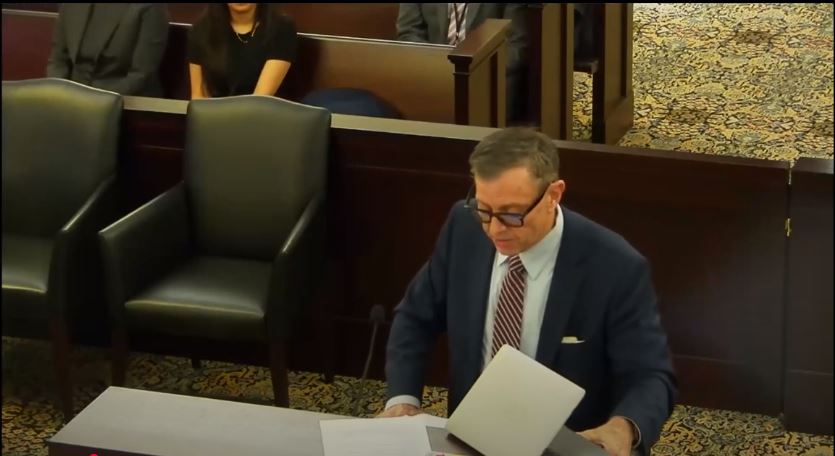The Michigan Supreme Court Wednesday shot down the state attorney general’s high-profile effort to criminally prosecute seven former public officials for their role in the Flint water crisis.
In a series of orders, the court left in place lower court dismissals of the charges, which were thrown out after an earlier Supreme Court ruling found that a prosecution team appointed by Attorney General Dana Nessel had improperly relied on a one-person grand jury to bring charges in 2021.
Wayne County Prosecutor Kym Worthy, appointed by Nessel as co-lead of the state’s prosecution team along with Solicitor General Fadwa Hammoud, had used the unusual tactic, in which prosecutors presented evidence in secret to a single judge to secure charges against multiple former public officials.
Flint Water Crisis Summary
The Flint Water Crisis was a public health crisis that started in 2014 after the drinking water for the city of Flint, Michigan was contaminated with lead and possibly Legionella bacteria. In April 2014, during a financial crisis, state-appointed emergency manager Darnell Earley changed Flint’s water source from the Detroit Water and Sewerage Department (sourced from Lake Huron and the Detroit River) to the Flint River. Residents complained about the taste, smell, and appearance of the water, and many raised concerns about its safety.
However, state and local officials repeatedly assured residents that the water was safe to drink. It was not until 2015, after months of protests and pressure from activists and public health experts, that the state finally admitted that the water was contaminated with lead.
The Flint Water Crisis had a devastating impact on the city’s residents, particularly children. Lead poisoning is especially harmful to children, and can cause a range of health problems, including learning disabilities, behavioral problems, and reduced IQ. An estimated 6,000 to 12,000 children were exposed to lead-contaminated water during the crisis.
The Flint Water Crisis is a story of government negligence and environmental injustice. The city’s decision to switch to the Flint River was made in an effort to save money, but it came at a great cost to the city’s residents. The crisis also exposed the deep racial and economic inequality in Flint, as the city’s predominantly Black and low-income residents were disproportionately affected by the contamination.
Flint Water Crisis FAQs
What caused the Flint Water Crisis?
The Flint Water Crisis was caused by a combination of factors, including:
- The city’s decision to switch to the Flint River as its water source. The Flint River is more corrosive than the Detroit water system, and this caused the city’s lead pipes to corrode and leach lead into the water.
- The state’s failure to properly treat the Flint River water. The Flint River water is more acidic than the Detroit water system, and this required the state to add corrosion inhibitors to the water to prevent lead from leaching into the pipes. However, the state failed to add enough corrosion inhibitors, which allowed the lead to leach into the water.
- The state’s failure to listen to residents’ concerns about the water quality. Residents complained about the taste, smell, and appearance of the water from the beginning, but the state repeatedly assured them that the water was safe to drink.
Who was affected by the Flint Water Crisis?
The Flint Water Crisis affected all residents of Flint, but it was particularly harmful to children. Lead poisoning is especially harmful to children, and can cause a range of health problems, including learning disabilities, behavioral problems, and reduced IQ. An estimated 6,000 to 12,000 children were exposed to lead-contaminated water during the crisis.
- What has been done to address the Flint Water Crisis?
- The state has taken a number of steps to address the Flint Water Crisis, including:
- Switching Flint back to the Detroit water system.
- Replacing lead pipes in Flint homes.
- Providing bottled water and water filters to residents.
- Providing medical care and educational support to children who were exposed to lead-contaminated water.
More Posts

How to create and share a Dropbox link
Simplified Sender and Receiver Dropbox Share Instructions to Someone NOT on your Team. Don't get caught up in another license or give access to your whole box by mistake.Dropbox Sender Share Instructions Log into your Dropbox account Hover over the file or folder...

Smell of marijuana no longer legal grounds for search
The Michigan Supreme Court has ruled that the smell of marijuana alone is no longer sufficient probable cause for police to conduct a warrantless search of a vehicle. This decision overturns a previous precedent where the odor of marijuana was considered enough...

Michigan Forfeiture News Articles
Can the police sieze your belongings and hold it without charging you with a crime?Civil asset forfeiture is a legal process that allows law enforcement agencies in Michigan to seize property they suspect is connected to criminal activity, even if the owner hasn't...

What Happens When the Government Takes Your Property?
Can the police sieze your belongings and hold it without charging you with a crime?Forfeiture laws in Michigan allow the government to seize property – like cash, cars, or even houses – if they believe it was involved in a crime. This can happen even if the owner...
Defending Against Criminal Sex Charges
Defense against false accusations of Criminal Sexual Conduct (CSC) in MichiganDefending against a false accusation of Criminal Sexual Conduct (CSC) in Michigan is a serious matter and requires a well-prepared legal strategy. Here are several steps you should take to...

Forfeiture without Criminal Charges
Can the police seize your belongings and hold it without charging you with a crime?Read the summary below and watch Attorney Michael Komorn in the Court of Appeals.Summary of "Ruben Delgado v. Michigan State Police": This case was filed in the Jackson County Circuit...

Criminal Sexual Conduct (CSC) – Michigan
Criminal Sexual Conduct (CSC) in Michigan: Definitions, Penalties, and Legal References.Criminal Sexual Conduct (CSC) is a set of laws in Michigan that define and penalize various forms of sexual offenses. These laws are categorized into four degrees, with each degree...

23andMe filed for Chapter 11 bankruptcy and your data is?
As of Friday 3/28/25, the firm’s shares were worth less than a dollar.If you are charged with a crime you're part of the State of Michigan family now. Call us - Because you don't want to be a part of that family. Komorn Law (248) 357-2550Genetic testing service...

Michigan Supreme Court Vacates Court of Appeals Ruling of State Anti-Terror Statute
Michigan Supreme Court Vacates Court of Appeals Ruling, Temporarily Preserves State Anti-Terror StatuteIf you are charged with a crime you're part of the State of Michigan family now. Call us - Because you don't want to be a part of that family. Komorn Law (248)...

Free Speech, Terror and Michigan Law
Michigan Supreme Court Vacates Court of Appeals Ruling, Temporarily Preserves State Anti-Terror StatuteIf you are charged with a crime you're part of the State of Michigan family now. Call us - Because you don't want to be a part of that family. Komorn Law (248)...










